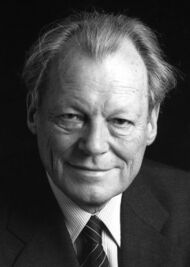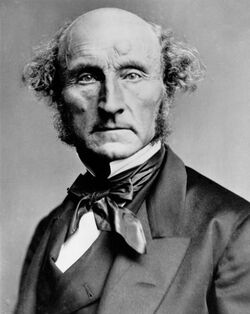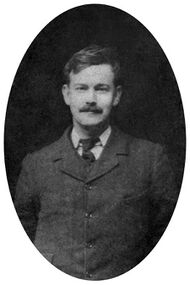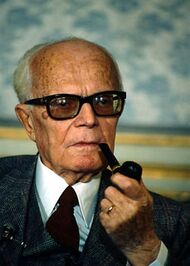Liberal socialism
Topic: Philosophy
 From HandWiki - Reading time: 14 min
From HandWiki - Reading time: 14 min
Liberal socialism is a socialist political philosophy that incorporates liberal principles.[1] Liberal socialism does not have the goal of completely abolishing capitalism and replacing it with socialism,[2] but it instead supports a mixed economy that includes both private property and social ownership in capital goods.[3][4] Although liberal socialism unequivocally favors a mixed market economy, it identifies legalistic and artificial monopolies to be the fault of capitalism[5] and opposes an entirely unregulated economy.[6] It considers both liberty and equality to be compatible and mutually dependent on each other.[1]
Principles that can be described as liberal socialist are based on the works of philosophers such as John Stuart Mill, Eduard Bernstein, John Dewey, Carlo Rosselli, Norberto Bobbio, Chantal Mouffe and Karl Polanyi.[7] Other important liberal socialist figures include Guido Calogero, Piero Gobetti, Leonard Hobhouse, John Maynard Keynes and R. H. Tawney. To Polanyi, liberal socialism's goal was overcoming exploitative aspects of capitalism by expropriation of landlords and opening to all the opportunity to own land.[8] Liberal socialism has been particularly prominent in British and Italian politics.[6]
Liberal socialism’s seminal ideas can be traced to John Stuart Mill, who theorised that capitalist societies should experience a gradual process of socialisation through worker-controlled enterprises, coexisting with private enterprises.[9] Mill rejected centralised models of socialism that could discourage competition and creativity, but he argued that representation is essential in a free government and democracy could not subsist if economic opportunities were not well distributed, therefore conceiving democracy not just as form of representative government, but as an entire social organisation.[10]
Variants and their history
Britain
John Stuart Mill
The main liberal English thinker John Stuart Mill's early economic philosophy was one of free markets. However, he accepted interventions in the economy, such as a tax on alcohol, if there were sufficient utilitarian grounds. He also accepted the principle of legislative intervention for the purpose of animal welfare.[11] Mill originally believed that "equality of taxation" meant "equality of sacrifice" and that progressive taxation penalised those who worked harder and saved more and was therefore "a mild form of robbery".[12]
Given an equal tax rate regardless of income, Mill agreed that inheritance should be taxed. A utilitarian society would agree that everyone should be equal one way or another. Therefore, receiving inheritance would put one ahead of society unless taxed on the inheritance. Those who donate should consider and choose carefully where their money goes—some charities are more deserving than others. Considering public charities boards such as a government will disburse the money equally. However, a private charity board like a church would disburse the monies fairly to those who are in more need than others.[13]
Mill later altered his views toward a more socialist bent, adding chapters to his Principles of Political Economy in defence of a socialist outlook and defending some socialist causes.[14] Within this revised work, he also made the radical proposal that the whole wage system be abolished in favour of a co-operative wage system. Nonetheless, some of his views on the idea of flat taxation remained,[15] albeit altered in the third edition of the Principles of Political Economy to reflect a concern for differentiating restrictions on "unearned" incomes, which he favoured; and those on "earned" incomes, which he did not favour.[16]
Mill's Principles of Political Economy, first published in 1848, was one of the most widely read of all books on economics in the period.[17] As Adam Smith's Wealth of Nations had during an earlier period, Mill's Principles of Economy dominated economics teaching. In the case of Oxford University, it was the standard text until 1919 when it was replaced by Alfred Marshall's Principles of Economics.
At some point, Mill also promoted substituting capitalist businesses with worker cooperatives, saying:
The form of association, however, which if mankind continue to improve, must be expected in the end to predominate, is not that which can exist between a capitalist as chief, and work-people without a voice in the management, but the association of the labourers themselves on terms of equality, collectively owning the capital with which they carry on their operations, and working under managers elected and removable by themselves.[18]
Ethical socialism
Liberal socialism has exercised influence in British politics, especially in the variant known as ethical socialism.[19][20] A key component of ethical socialism is in its emphasis on moral and ethical critiques of capitalism and building a case for socialism on moral or spiritual grounds as opposed to rationalist and materialist grounds. Ethical socialists advocated a mixed economy that involves an acceptance of a role of both public enterprise as well as socially-responsible private enterprise.[4] Ethical socialism was founded by Christian socialist R. H. Tawney and its ideals were also connected to Fabian and guild-socialist values.[21]
It emphasizes the need for a morally-conscious economy based upon the principles of service, cooperation and social justice while opposing possessive individualism.[22] Ethical socialism is distinct in its focus on criticism of the ethics of capitalism and not merely criticism of material issues of capitalism. Tawney denounced the self-seeking amoral and immoral behaviour that he claimed is supported by capitalism.[20] He opposed what he called the "acquisitive society" that causes private property to be used to transfer surplus profit to "functionless owners"—capitalist rentiers.[22] However, Tawney did not denounce managers as a whole, believing that management and employees could join together in a political alliance for reform.[22] He supported the pooling of surplus profit through means of progressive taxation to redistribute these funds to provide social welfare, including public health care, public education and public housing.[23]
Tawney advocated nationalization of strategic industries and services.[24] He also advocated worker participation in the business of management in the economy as well as consumer, employee, employer and state cooperation in the economy.[24] Though he supported a substantial role for public enterprise in the economy, Tawney stated that where private enterprise provided a service that was commensurate with its rewards that was functioning private property, then a business could be usefully and legitimately be left in private hands.[4] Ethical socialist Thomas Hill Green supported the right of equal opportunity for all individuals to be able freely appropriate property, but he claimed that acquisition of wealth did not imply that an individual could do whatever they wanted to once that wealth was in their possession. Green opposed "property rights of the few" that were preventing the ownership of property by the many.[25]
Ethical socialism is an important ideology of the British Labour Party. Labour Prime Minister Clement Attlee supported the ideology, which played a large role in his party's policies during the postwar 1940s.[26] Half a century after Attlee's tenure, Tony Blair, another Labour Prime Minister, also described himself as an adherent of ethical socialism, which for him embodies the values of "social justice, the equal worth of each citizen, equality of opportunity, community".[27] Influenced by Attlee and John Macmurray (who himself was influenced by Green),[28] Blair has defined the ideology in similar terms as earlier adherents—with an emphasis on the common good, rights and responsibilities as well as support of an organic society in which individuals flourish through cooperation.[28] Blair argued that Labour ran into problems in the 1960s and 1970s when it abandoned ethical socialism and that its recovery required a return to the values promoted by the Attlee government.[6] However, Blair's critics (both inside and outside Labour) have accused him of completely abandoning socialism in favour of capitalism.[29]
Germany

An early version of liberal socialism was developed in Germany by Franz Oppenheimer.[30] Though he was committed to socialism, Oppenheimer's theories inspired the development of the social liberalism that was pursued by German Chancellor Ludwig Erhard, who said the following: "As long as I live, I will not forget Franz Oppenheimer! I will be as happy if the social market economy—as perfect or imperfect as it might be—continues to bear witness to the work, to the intellectual stance of the ideas and teachings of Franz Oppenheimer".[30]
In the 1930s, the Social Democratic Party of Germany (SPD), a reformist socialist political party that was up to then based upon revisionist Marxism, began a transition away from Marxism towards liberal socialism. After it was banned by the Nazi regime in 1933, the SPD acted in exile through the Sopade. In 1934, the Sopade began to publish material that indicated that the SPD was turning towards liberal socialism.[31] Curt Geyer, a prominent proponent of liberal socialism within the Sopade, declared that Sopade represented the tradition of Weimar Republic social democracy—liberal democratic socialism and declared that Sopade's held true to its mandate of traditional liberal principles combined with the political realism of socialism.[32] After the restoration of democracy in West Germany, the SPD's Godesberg Program in 1959 eliminated the party's remaining Marxist policies. The SPD then became officially based upon freiheitlicher Sozialismus (liberal socialism).[33] West German Chancellor Willy Brandt has been identified as a liberal socialist.[34]
Italy
Italian socialist Carlo Rosselli was inspired by the definition of socialism by the founder of social democracy, Eduard Bernstein, who defined socialism as "organized liberalism". Rosselli expanded on Bernstein's arguments by developing his notion of liberal socialism (Italian: socialismo liberale).[35] In 1925, Rosselli defined the ideology in his work of the same name in which he supported the type of socialist economy defined by socialist economist Werner Sombart in Der modern Kapitalismus (1908) that envisaged a new modern mixed economy that included both public and private property, limited economic competition and increased economic cooperation.[3] While appreciating principles of liberalism as an ideology that emphasized liberation, Rosselli was deeply disappointed with liberalism as a system that he described as having been used by the bourgeoisie to support their privileges while neglecting the liberation components of liberalism as an ideology and thus viewed conventional liberalism as a system that had merely become an ideology of "bourgeois capitalism".[36] At the same time, Rosselli appreciated socialism as an ideology, but he was also deeply disappointed with conventional socialism as a system.[37] In response to his disappointment with conventional socialism in practice, Roselli declared: "The recent experiences, all the experiences of the past thirty years, have hopelessly condemned the primitive programs of the socialists. State socialism especially—collectivist, centralizing socialism—has been defeated".[37] Rosselli's liberal socialism was partly based upon his study and admiration of British political themes of the Fabian Society and John Stuart Mill (he was able to read the English versions of Mill's work On Liberty prior to its availability in Italian that began in 1925). His admiration of British socialism increased after his visit to the United Kingdom in 1923 where he met George Drumgoole Coleman, R. H. Tawney and other members of the Fabian Society.[38]
An important component of Italian liberal socialism developed by Rosselli was its anti-fascism.[39] Rosselli opposed fascism and believed that fascism would only be defeated by a revival of socialism.[39] Rosselli founded the Giustizia e Libertà (Justice and Liberty) movement as an resistance movement founded in the 1930s in opposition to the Fascist regime in Italy.[40] Ferruccio Parri—who later became Prime Minister of Italy—and Sandro Pertini—who later became President of Italy—were among Giustizia e Libertà's leaders.[36] Giustizia e Libertà was committed to militant action to fight the Fascist regime and it saw Benito Mussolini as a ruthless murderer who himself deserved to be killed as punishment.[41] Various early schemes were designed by the movement in the 1930s to assassinate Mussolini, including one dramatic plan of using an aircraft to drop a bomb on Piazza Venezia where Mussolini resided.[39]
After Rosselli's death, liberal socialism was developed in Italian political thought by Guido Calogero.[42] Unlike Rosselli, Calogero considered the ideology as a unique ideology of "liberalsocialism" that was separate from existing liberal and socialist ideologies.[42] Calogero created the "First Manifesto of Liberalsocialism" in 1940 that stated the following:
At the basis of liberalsocialism stands the concept of the substantial unity and identity of ideal reason, which supports and justifies socialism in its demand for justice as much as it does liberalism in its demand for liberty. This ideal reason coincides with that same ethical principle to whose rule humanity and civilization, both past and future, must always measure up. This is the principle by which we recognize the personhood of others in contrast to our own person and assign to each of them a right to own their own.
After World War II, Ferruccio Parri of the liberal socialist Action Party briefly served as Prime Minister of Italy in 1945.[38][43] In 1978, liberal socialist Sandro Pertini of the Italian Socialist Party was elected President of Italy in 1978 and served as President until 1985.[43]
Belgium
Chantal Mouffe is a prominent Belgian advocate of liberal socialism.[44] She describes liberal socialism as the following:
To deepen and enrich the pluralist conquests of liberal democracy, the articulation between political liberalism and individualism must be broken, to make possible a new approach to individuality that restores its social nature without reducing it to a simple component of an organic whole. This is where the socialist tradition of thought might still have something to contribute to the democratic project and herein lies the promise of a liberal socialism.
Hungary
In 1919, the Hungarian politician Oszkár Jászi declared his support for what he termed "liberal socialism" while denouncing "communist socialism".[45] Opposed to classical social democracy's prevalent focus on support from the working class, Jászi saw the middle class and smallholder peasants as essential to the development of socialism and spoke of the need of a "radical middle-class".[45] His views were especially influenced by events in Hungary in 1919 involving the Bolshevik revolution during which he specifically denounced the Marxist worldview shortly after the collapse of the Hungarian Soviet Republic, calling his views "Anti-Marx". His criticism of Marxism was centered on its mechanical and value-free and amoral methodology:[46]
Jászi promoted a form of co-operative socialism that included liberal principles of freedom, voluntarism and decentralization.[45] He counterpoised this ideal version of socialism with the then-existing political system in the Soviet Union, which he identified as based upon dictatorial and militarist perils, statism and a crippled economic order where competition and quality are disregarded.[47]
Jászi's views on socialism and especially his works justifying the denouncement of Bolshevik Communism came back into Hungarian public interest in the 1980s when copies of his manuscripts were discovered and were smuggled into Hungary that was then under Communist rule.[47]
See also
- Christian socialism
- Economic liberalism
- Libertarian socialism
- Ethical socialism
- Liberalism
- Liberal Socialist Party
- Market Socialism
- Mixed economy
- Reformism
- Social corporatism
- Social democracy
- Social liberalism
- Social market economy
- Third way
Notes
- ↑ 1.0 1.1 Gerald F. Gaus, Chandran Kukathas. Handbook of Political Theory. SAGE Publications, 2004. p. 420.
- ↑ Ian Adams. Ideology and Politics in Britain Today. Manchester University Press, 1998. p. 127.
- ↑ 3.0 3.1 Pugliese, 1999, p. 99.
- ↑ 4.0 4.1 4.2 Thompson, 2006, pp. 60–61.
- ↑ Roland Willey Bartlett. The Success of Modern Private Enterprise. Interstate Printers & Publishers, 1970. p. 32. "Liberal socialism, for example, is unequivocally in favour of the free market economy and of freedom of action for the individual and recognizes in legalistic and artificial monopolies the real evils of capitalism."
- ↑ 6.0 6.1 6.2 Steve Bastow, James Martin. Third way discourse: European ideologies in the twentieth century. Edinburgh, Scotland, UK: Edinburgh University Press, Ltd, 2003. p. 72.
- ↑ Nadia Urbinati. J.S. Mill's Political Thought: A Bicentennial Reassessment. Cambridge University Press, 2007. p. 101.
- ↑ Dale, Gareth (14 June 2016). "Karl Polanyi: A Life on the Left". Columbia University Press. https://books.google.com.br/books?id=l3m0CwAAQBAJ&pg=PT61&lpg=PT61&dq=liberal+socialism+polanyi&source=bl&ots=PvsiUEGTQg&sig=PS0zqDW1gQAmXDxniPKF7qquJTk&hl=pt-BR&sa=X&ved=0ahUKEwikouzyzLHUAhVGFpAKHTM3AlEQ6AEIRTAE#v=onepage&q=liberal+socialism+polanyi&f=false. Retrieved 4 April 2018.
- ↑ http://journals.sagepub.com/doi/abs/10.1177/1470594x03002002004
- ↑ https://periodicos.ufsc.br/index.php/ethic/article/viewFile/1677-2954.2010v9n1p17/18741
- ↑ [1]
- ↑ "IREF | Pour la liberte economique et la concurrence fiscale" (PDF).
- ↑ (Strasser, 1991).
- ↑ Mill, John Stuart and Bentham, Jeremy edited by Ryan, Alan. (2004). Utilitarianism and other essays. London: Penguin Books. p. 11. ISBN 0-14-043272-8.
- ↑ Wilson, Fred (2007). "John Stuart Mill: Political Economy". Stanford Encyclopedia of Philosophy. Stanford University. http://plato.stanford.edu/entries/mill/#PolEco. Retrieved 4 May 2009.
- ↑ Mill, John Stuart (1852). "On The General Principles of Taxation, V.2.14". Principles of Political Economy. Library of Economics and Liberty. (3rd edition; the passage about flat taxation was altered by the author in this edition, which is acknowledged in this online edition's footnote 8: "This sentence replaced in the 3rd ed. a sentence of the original: 'It is partial taxation, which is a mild form of robbery'").
- ↑ Ekelund, Robert B. Jr.; Hébert, Robert F. (1997). A history of economic theory and method (4th ed.). Waveland Press [Long Grove, Illinois]. p. 172. ISBN 1-57766-381-0.
- ↑ Principles of Political Economy with some of their Applications to Social Philosophy, IV.7.21. John Stuart Mill: Political Economy, IV.7.21.
- ↑ John Dearlove, Peter Saunders. Introduction to British Politics. Wiley-Blackwell, 2000. p. 427.
- ↑ 20.0 20.1 Thompson, 2006, p. 52.
- ↑ Thompson, 2006, p. 52, 58, 60.
- ↑ 22.0 22.1 22.2 Thompson, 2006, p. 58.
- ↑ Thompson, 2006, p. 58–59.
- ↑ 24.0 24.1 Thompson, 2006, p. 59.
- ↑ Carter, 2003, p. 35.
- ↑ David Howell. Attlee. Haus Publishing Ltd, 2006. pp. 130–132.
- ↑ Stephen D. Tansey, Nigel A. Jackson. Politics: The Basics. Fourth Edition. Routledge, 2008. p. 97.
- ↑ 28.0 28.1 Carter, 2003, p. 189–190.
- ↑ Florence Faucher-King, Patrick Le Galès, Gregory Elliott. The New Labour Experiment: Change and Reform Under Blair and Brown. Stanford University Press, 2010. p. 18.
- ↑ 30.0 30.1 Kevin Rep. Reformers, critics, and the paths of German modernity: anti-politics and the search for alternatives, 1890–1914. Harvard University Press, 2000. p. 238.
- ↑ Edinger, 1956, p. 215.
- ↑ Edinger, 1956, p. 219–220.
- ↑ Dietrich Orlow. Common destiny:a comparative history of the Dutch, French, and German social democratic parties, 1945–1969. Berghahn Books, 2000. p. 108.
- ↑ Stephen Eric Bronner. Ideas in action: political tradition in the twentieth century. Rowman & Littlefield Publishers, Inc., 1999. p. 104.
- ↑ Manfred B. Steger. The Quest for Evolutionary Socialism. Cambridge, England, UK: Cambridge University Press, 2006. p. 146.
- ↑ 36.0 36.1 Pugliese, 1999, p. 51.
- ↑ 37.0 37.1 Pugliese, 1999, p. 53.
- ↑ 38.0 38.1 Pugliese, 1999, p. 59–60.
- ↑ 39.0 39.1 39.2 Zygmunt G. Barański, Rebecca J. West. "Socialism, Communism, and other 'isms'" by Robert S. Dombroski, The Cambridge companion to modern Italian culture. Cambridge, England, UK: Cambridge University Press, 2001. p. 122.
- ↑ James D. Wilkinson. The Intellectual Resistance Movement in Europe. Harvard University Press, 1981. p. 224.
- ↑ Spencer Di Scala. Italian socialism: between politics and history. Boston, Massachusetts, USA: University of Massachusetts Press, 1996. p. 87.
- ↑ 42.0 42.1 Luiz Carlos Bresser-Pereira. Democracy and public management reform: building the republican state. Oxford, England, UK: Oxford University Press, 2004. p. 84.
- ↑ 43.0 43.1 Pugliese, 1999, p. 236.
- ↑ María José Coperiás Aguilar. Culture and power: challenging discourses. English edition. Valencia, Spain: Valencia University Press, Ltd., 2000. p. 39.
- ↑ 45.0 45.1 45.2 Litván, 2006, p. 125.
- ↑ Litván, 2006, p. 199.
- ↑ 47.0 47.1 Litván, 2006, p. 200.
References
- Noel W. Thompson. Political economy and the Labour Party: the economics of democratic socialism, 1884–2005. 2nd edition. Oxon, England, UK; New York City, USA: Routledge, 2006.
- Matt Carter. T.H. Green and the development of ethical socialism. Exeter, England, UK; Charlottesville, Virginia, USA: Imprint Academic, 2003.
- Lewis Joachim Edinger. German exile politics: the Social Democratic Exexctive Committee in the Nazi era. University of California Press, 1956.
- Stanislao G. Pugliese. Carlo Rosselli: socialist heretic and antifascist exile. Harvard University Press, 1999.
- György Litván. A twentieth-century prophet: Oszkár Jászi, 1875–1957. English edition. Budapest, Hungary: Central European Press, 2006.
 KSF
KSF




